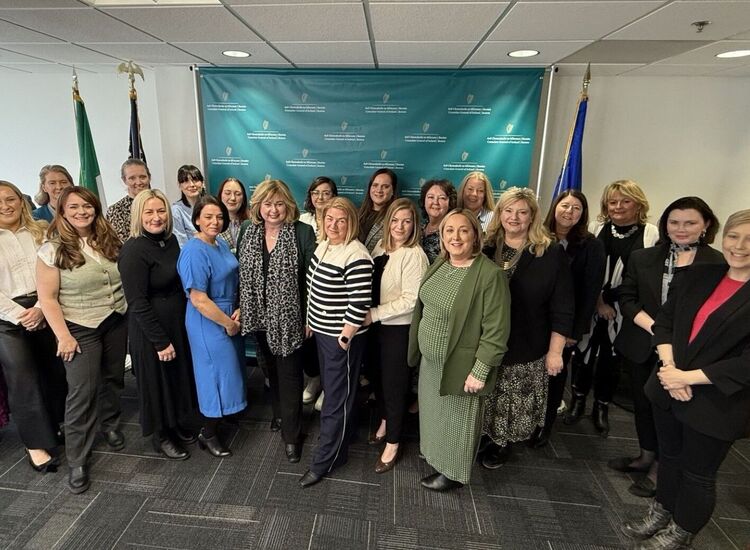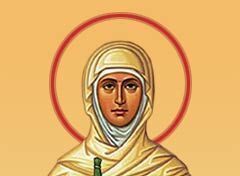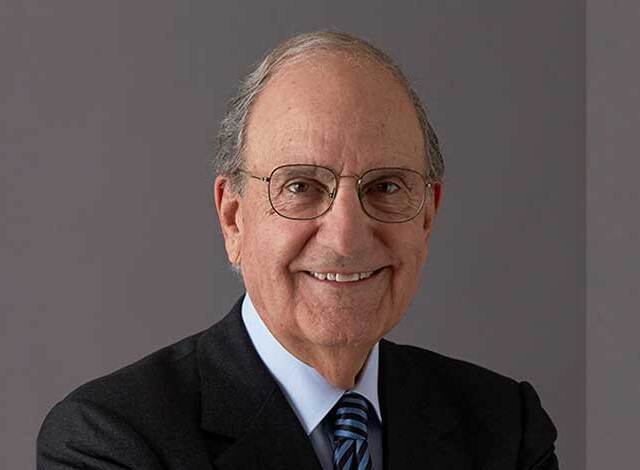Bill Flynn
By Ray O’Hanlon
William J. “Bill Flynn, a top corporate executive who applied his considerable energies and business acumen to the quest for a lasting peace in Northern Ireland, has died.
Flynn, the former Chairman and CEO of the Mutual of America insurance company, was 91.
During the 1990s, Flynn emerged as a front line figure in Irish America’s effort to secure an end to violence and a new political accommodation in the North.
He was a member of the Irish American peace delegation that preceded the first visit to Northern Ireland by President Bill Clinton.
Flynn was grand marshal of the 1996 New York St. Patrick’s Day parade and subsequently became involved in the governance of the parade, which was embroiled at the time in the dispute over the exclusion of a gay Irish marching group and also facing considerable financial and administrative challenges.
He would later walk away from the parade governing corporation expressing disillusionment with the way it was being managed and his inability to bring about fundamental change.
His work for peace in Northern Ireland would bring far greater reward.
As news of Flynn’s passing broke over the weekend (he died on Saturday, June 2) tributes from both sides of the Atlantic began to flow.
Sinn Féin TD and former party leader, Gerry Adams, described Flynn as a “champion of peace in Ireland.”
Said Adams in a statement: “I want to extend my sincerest condolences and solidarity to Peggy Flynn and the Flynn family on the death of Bill. He was one of America’s foremost business leaders, as well as a patron of great causes in support of humanitarian, civil liberties and health issues.
"Bill was a first generation Irish American who has family connections in County Down and County Mayo.
"In Ireland and among Irish Americans, he is also one of those, along with Niall O’Dowd, Chuck Feeney and Bruce Morrison, who played a pivotal role in creating the conditions for the IRA cessation in August 1994, and in opening up political support in the USA for the Irish peace process.
"I have known Bill Flynn for more than 25 years. We first met in Belfast after Bill had organized and funded a peace conference in Derry in 1992 called 'Beyond Hate.' He met and was impressed by Martin McGuinness and later he travelled to Belfast where he and I met.
"Later, he became part of ‘Americans for a New Irish Agenda’ which later became widely known as the Connolly House group.
"In 1994, he arranged for the National Committee on American Foreign Policy to organize a conference on Ireland to which I was invited.
"I applied for a visa which was eventually agreed and I received a 48 hour restricted visa to New York. It was a key moment in the efforts for peace.
"Since then, Bill has remained solidly behind the peace process. He travelled to Ireland many times, and consciously sought to reach out to unionists and loyalists and to engage them in the process of peace making and partnership government.
"Bill’s importance can be measured in the frequency with which all of the governments – Irish, British and U.S. – talk to him and seek to involve him in whatever the current initiative might be.
"I always make a point of trying to meet Bill every time I visit New York. His analysis of the political situation in the USA and in Ireland, were always insightful. He was a good American patriot and a decent human being. Ar dheis Dé go raibh a anam dílis."
A death notice in the New York Times today described Mr. Flynn as the beloved husband of Peggy, loving father of Maureen Flynn Welsh, William K. Flynn and the late James Edward and Robert H. Flynn, grandfather of 11 and great-grandfather of one.
Visitation will be Tuesday 2-4 p.m. and 7 to 9 p.m. at Fairchild Sons Funeral home, 1201 Franklin Avenue, Garden City, Long Island, New York. A Mass of Christian Burial will take place on Wednesday, 10 a.m. at St. Joseph’s Roman Catholic Church in Garden City. Interment will follow at Holy Rood Cemetery in Westbury.
Some years ago, coinciding with the IRA’s actions to put its weapons beyond use, the Irish Echo ran a profile of Mr. Flynn and here below is an extract.
When William J. Flynn first became involved in the search for a peaceful settlement in Northern Ireland the place looked like the political equivalent of Florida after Hurricane Andrew.
If he had applied his industry’s actuarial techniques at the time, Flynn would have quickly concluded that becoming involved in the North’s daily strife would be a high risk, low return venture.
He jumped in anyway.
And now, close to twenty years later, Flynn is drawing a well-earned dividend in the form of the IRA’s withdrawal from war.
Flynn has dedicated his business life to turning profits and boosting shares. Much of his own time has been dedicated to turning swords into plowshares.
At his core, Flynn is a businessman and realist more than he is a theorist and dreamer.
And yet, his pursuit of peace brought with it the kind of risk that only comes with chasing a dream.
Wading into the morass that is the history of Ireland and its larger neighbor to the east was always going to result in surprises.
Last week’s IRA order to dump arms was, for sure, one of the better ones. And Flynn was ready for it.
Flynn’s resume runs a long arm’s length.
But to most he is known as former CEO and chairman of the Park-Avenue based Mutual of America insurance company, and as the still active chairman of the National Committee on America Foreign Policy, a think-tank with far flung reach and high-placed influence.
Over the years, Flynn combined his roles in both organizations into what became a most unusual stratagem.
He used his numerous economic, political and diplomatic connections to engage with and hold the attention of the warring groups in Northern Ireland and, additionally, the governments in Dublin, London and Washington.
On a more practical level, he literally threw open the doors of a Manhattan corporate tower to a most unusual assemblage of guests.
It was at 320 Park Avenue, Mutual’s spire-topped headquarters, that Irish president Mary Robinson shook hands with, of all people, the hard-edged leaders of Ulster Loyalist paramilitarism. It was as odd an encounter as it was once unimaginable.
But that meeting - as would innumerable other events and encounters at 320 Park - would be simply another piece in the jigsaw assembled, painstakingly, by Flynn and others of Irish America who passionately believed that the United States, its prestige, and ultimately its president, could make a real difference in Ireland.
Flynn’s involvement in the quest for normality took form in the 1980s when he offered his assistance to the Peace People group led by Nobel Peace Prize winners Betty Williams and Mairead Corrigan.
Flynn was sympathetic towards the group, but soon concluded that more would be needed to take the cause of peace to the ultimate level.
In the years that followed, Flynn and his colleagues at the National Committee worked out a ten-point peace plan for the North. It was a simple, clear and unambiguous formula. But what chance for even a sensible plan if dropped into a boiling cauldron?
A better one if the plan for peace was delivered in person.
In September of 1993, Flynn traveled to Belfast with an Irish American delegation.
The mission would ultimately pave the way for President Bill Clinton, but, in the shorter term, it would be seen as having a real effect on the lives of people in the six counties.
“The IRA decided to call a ceasefire while we were there. That sure impressed the hell out of me,” Flynn said.
The positive response would lead to more visits, both for the group and for Flynn himself.
And as political leaders argued back and forth, won office and left office, Flynn, selling peace as he might a sound insurance policy, emerged as a constant.
He hosted and cajoled, shook hands and scolded. Most importantly, perhaps, he developed a reputation for a salty honesty. He had seen enough, heard enough and wasn’t afraid to speak his own mind.
“Bill has been quite unique in his willingness to use his well-earned status as an establishment figure to take a lot of risks and be very persistent in his pursuit of a dream, the dream that is peace,” said former congressman Bruce Morrison, a member of Flynn’s peace delegation.
“In the early 1990s, his willingness to play that leading role made a huge difference. Many would not have taken that kind of risk at that time,” Morrison said.
Flynn, for sure, brought his business edge and personal toughness to the table.
But ultimate control would always rest in the hands of those who were the targets of Flynn’s rather singular powers of persuasion, the IRA among them.
“These people have now had the courage to put down their arms even though the policing problem remains unsolved,” said Flynn.
Not for the first time, Flynn has been impressed by people who have been dismissed repeatedly as being beyond the bounds of politic reason.
But though he found himself pleasantly surprised by the content and scope of the IRA statement, Flynn was not completely taken aback by its naissance.
“We provided money and facilities, no matter the ups or downs,” said Flynn of his friends, colleagues and associates.
“And we stuck with it. The secret of success is sticking with it, and never being forced to say something that you’re actually against. We Irish are splitters, but the key to this was that we did not split.”








